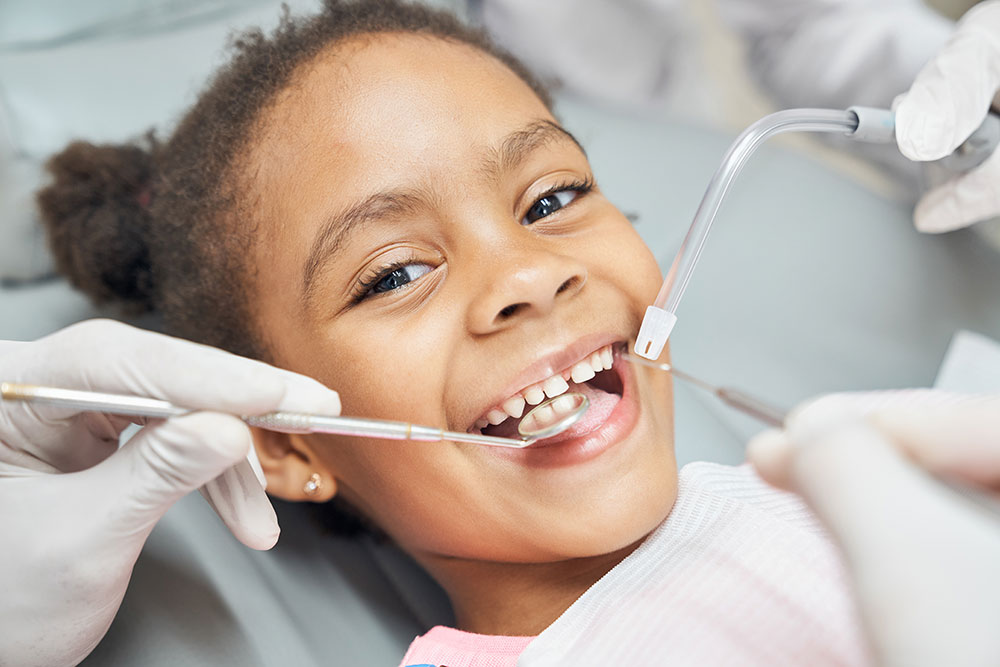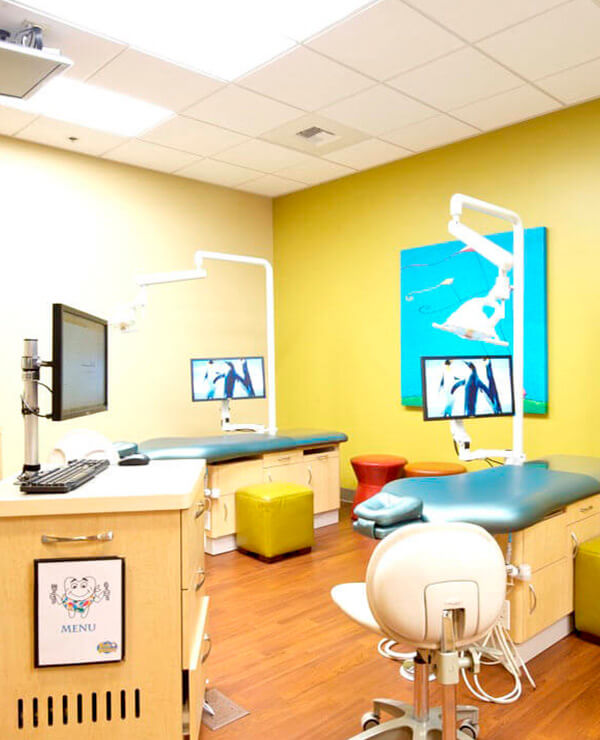Children Dentist Near Me: Making Certain Healthy And Balanced Smiles for Kids
Children Dentist Near Me: Making Certain Healthy And Balanced Smiles for Kids
Blog Article
How Pediatric Dentistry Addresses Special Oral Demands and Obstacles Encountered by Expanding Children
Pediatric dentistry is a customized area that responds and identifies to the unique dental needs of kids as they grow. This technique not only minimizes immediate oral challenges yet likewise lays the groundwork for lasting oral wellness.
Significance of Very Early Dental Sees
Early oral check outs are crucial for developing a foundation of great oral health and wellness in children. The American Academy of Pediatric Dentistry advises that a child's initial dental browse through occur by their initial birthday or within 6 months of the eruption of their first tooth. These early visits offer several objectives, including informing moms and dads about appropriate dental hygiene methods, dietary selections, and the significance of routine oral care.
During these brows through, pediatric dental experts assess the kid's dental health and wellness, monitor the advancement of teeth, and recognize potential problems such as imbalance or degeneration. Early treatment can prevent much more serious issues in the future, guaranteeing that kids develop healthy dental practices and minimizing stress and anxiety bordering dental brows through.
Furthermore, establishing a connection with a pediatric dentist promotes a sense of comfort and count on, making future check outs much less challenging. The dental practitioner can provide tailored advice that aligns with the child's developing phase, encouraging moms and dads to make enlightened choices concerning their youngster's dental health and wellness. Generally, very early oral visits play a vital role in advertising long-lasting dental health and wellness, making them a necessary element of pediatric health care.
Typical Dental Issues in Children
Understanding usual dental problems in kids is necessary for advertising their oral wellness and wellness. Kids face unique oral difficulties because of their developing teeth and transforming dental environments. Amongst the most common issues are cavities, usually arising from insufficient dental health practices and high sugar consumption. Early discovery and treatment are essential to avoid further difficulties.
One more considerable concern is malocclusion, which describes misalignment of teeth. This can cause difficulties in chewing, speech problems, and enhanced threat of dental trauma. Pediatric dental professionals usually suggest orthodontic analyses to address these problems as children grow.
Furthermore, oral trauma is typical in energetic children, especially due to sports and play. Injuries can range from damaged teeth to complete avulsion, demanding timely analysis and treatment to preserve dental honesty.
Techniques for Managing Dental Anxiousness
Oral stress and anxiety is an usual issue among kids, commonly stemming from unfamiliar atmospheres and concern of discomfort - pediatric dentistry oakland. Handling this stress and anxiety properly is crucial to guarantee that kids get needed oral treatment without excessive stress. Pediatric dentists employ numerous techniques to reduce stress and anxiety and produce a much more comfortable experience
First, the use of an inviting, child-friendly workplace atmosphere can significantly reduce anxiety. Vibrant designs, toys, and pleasant personnel help develop a feeling of security and familiarity. In addition, efficient communication is essential; pediatric dental practitioners commonly discuss procedures in straightforward, non-threatening terms to assist demystify the process.
Distraction strategies, such as offering headphones with songs or allowing youngsters to view video clips during therapy, can likewise divert attention from possible discomfort. Additionally, behavioral monitoring techniques, consisting of positive support, encourage teamwork by commending kids forever habits.

Duty of Preventive Care
Precautionary treatment plays an important function in pediatric dental care, focusing on preserving dental health and stopping potential issues before they emerge. By applying a positive method, pediatric dental practitioners aim to enlighten both youngsters and their caretakers about the relevance of dental hygiene and routine dental visits. This education includes direction on correct cleaning and flossing techniques, as well as the value of a balanced diet in promoting dental health and wellness.
Regular dental check-ups are essential for very early detection of tooth cavities, misalignment, and other dental wellness worries. Throughout these check outs, pediatric dental experts can apply fluoride treatments to reinforce enamel and give oral sealants to secure against degeneration in at home risk locations of the teeth. Additionally, these check-ups serve as a possibility for dental practitioners to keep an eye on the advancement of a youngster's teeth and jaws, making sure that any kind of irregularities are dealt with promptly.
In addition, pediatric dental experts typically assess youngsters's practices such as long term or thumb-sucking pacifier use, which might impact dental placement. By dealing with these behaviors early, precautionary care not only fosters a healthy and balanced smile but additionally instills long-lasting dental health and wellness practices in kids, establishing the foundation for a life time of good oral hygiene.

Transitioning to Teen Dentistry
As youngsters grow and create, their dental demands progress, leading to distinctive considerations in teenage dentistry. This change marks an essential period where the mouth undertakes significant adjustments, including the eruption of long-term teeth and the potential beginning of orthodontic problems. Teenagers usually experience increased freedom, which can impact their oral health practices and dietary options, necessitating tailored academic approaches.
During this stage, oral professionals focus on preventive care and very early treatment techniques. Routine exams become critical for keeping an eye on the development of teeth and jaw alignment, determining concerns such as dental caries, gum disease, and malocclusion. Adolescents likewise need advice on taking care of oral health difficulties related to hormone adjustments, such as raised susceptibility to gingivitis.
Moreover, the psychosocial aspects of dental care are essential; dental stress and anxiety may peak during adolescence, making it vital for professionals to use reliable interaction approaches to relieve anxieties. By cultivating a favorable dental experience, specialists can encourage lifelong oral health behaviors. Transitioning to teenage dental care is not simply a shift in treatment modalities but a comprehensive approach to sustain the special developmental and psychological demands of expanding people.
Final Thought
In conclusion, pediatric dentistry plays an essential duty in attending to the distinct dental demands of youngsters with early intervention, effective management of usual oral concerns, and the implementation of preventive care approaches. By producing a supportive atmosphere and using methods to ease stress and anxiety, pediatric dentists cultivate favorable dental experiences that encourage lifelong dental health behaviors. The shift to adolescent dental care further makes sure that the developing oral requirements of expanding individuals are consulted with specific treatment and experience.
Pediatric dentistry is a customized field that reacts and recognizes to the distinctive oral requirements of youngsters as they grow (pediatric dentistry oakland). The American Academy of Pediatric Dental care advises that a kid's initial dental see occur by their very first birthday celebration or within six months of the eruption of their very first tooth. By applying a positive technique, pediatric dental practitioners aim to inform both youngsters and their caregivers regarding the relevance of dental hygiene this hyperlink and routine oral visits.Additionally, the psychosocial facets of oral care are important; oral stress and anxiety check my blog might come to a head during adolescence, making it necessary for practitioners to employ efficient interaction approaches to alleviate worries.In final thought, pediatric dental care plays a crucial duty in addressing the one-of-a-kind oral needs of children through early intervention, effective administration of typical dental problems, and the application of precautionary treatment methods
Report this page